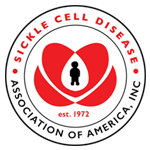Download a Printable Brochure | Download a Printable Statement
Two gene therapies were approved in Dec. 2023 by the Food and Drug Administration (FDA) to treat sickle cell disease: exagamglogene autotemcel and lovotibeglogene autotemcel. You probably have questions about these new treatment options. Read more below.
Is gene therapy a cure for sickle cell disease?
Gene therapy is a potentially curative therapy. This means that it could act as a cure, but it is too new to say for sure. It has been shown to result in a significant decline in pain episodes, but we need to learn more about long-term impacts and side effects. It is also not clear whether this is a “one-and-done” treatment. The FDA currently recommends 15 years of patient follow up after treatment.
How does gene therapy work?
- Step One: Doctors collect stem cells from your body. The blood-forming stem cells make your red blood cells and other blood cells. The DNA in these stem cells create sickled red blood cells. Collecting enough stem cells often needs several sessions.
- Step Two: The stem cells are taken to a lab. with exagamglogene autotemcel, technicians edit the cells. Lovotibeglogene autotemcel uses a technique called gene addition. After either gene therapy, your stem cells will make red blood cells that don’t sickle in your body.
- Step Three: While your stem cells are having gene therapy, you will receive chemotherapy to remove the original cells from your bone marrow.
- Step Four: Your stem cells that had gene therapy are injected back into your body. While you wait for these stem cells to grow and generate new blood cells, you will need medical support. Plan on at least a month in the hospital and then frequent clinical visits for several months.
- Step Five: Follow up visit will be with the gene therapy center for a while, then likely with a sickle cell center for 15 years.
When will it be available?
Gene therapy became available in 2024.
Am I eligible for gene therapy?
Gene therapy is approved for people ages 12 and up. Sickle cell disease SS and S-beta-zero-thalassemia are eligible. The FDA indicates that sickle cell disease SC is not included.
What are the side effects?
Gene therapy requires you to have chemotherapy. This means it could result in:
- Infertility or secondary cancer
- Temporary weakening of the immune system so that you cannot fight off any infections
- Temporary hair loss
Where can I receive gene therapy?
Only a few centers across the USA offer gene therapy for sickle cell disease. Sites must have both medical expertise and willingness to accept a complex cost structure.
How much will it cost? Will insurance cover it?
Gene therapy is expensive, and FDA-approved high-cost medications can come with barriers. Exagamglogene autotemcel is estimated to cost $2.2 million, and lovotibeglogene autotemcel is estimated to cost $3.1 million. Initiatives like the Centers for Medicare and Medicaid Services’ Cell and Gene Therapy Access Model may help reduce costs for individuals on Medicaid.
Does gene therapy work for all types of SCD?
As far as we know, yes. It is designed to be able to help raise fetal hemoglobin (HbF), which should work for all different kinds of sickle cell disease. However, the amount of experience with the different kinds has not been nearly the same – we know the most for SS and S Beta zero thalassemia types.
Are we the first community to receive gene therapy?
Exagamglogene autotemcel is the first approved use of gene editing. However, gene addition therapy has been used to treat other conditions, including:
- Retinal degeneration
- Spinal muscular atrophy
- Beta-thalassemia
- X-linked Adrenoleukodystrophy
- Hemophilia A & B
- Bladder cancer
- Acute-lymphoblastic leukemia
To learn more about the gene therapies used to treat these conditions, click here.
For a longer (but not complete) list of conditions that have been treated using gene therapy, click here.
Is it safe? How do I know if this is right for me?
For many people, the benefits of this new treatment outweigh the risks. Your doctors will help you determine whether this is a good option for you.
What questions should I ask my doctor?
- How long will this take?
- What is the time commitment?
- Where is the nearest treatment center?
- What are my other options?
How do I learn more about gene therapy?
There are several resources available. The below sources are considered trustworthy and non-biased by SCDAA.
- The Democratizing Education for Sickle Cell Gene Therapy Project created materials with input from individuals with SCD and their families. Read their FAQs and visit their website.
- SCDAA has produced several videos on gene therapy. Watch the gene therapy masterclass and this webinar to learn more.
- OneSCDVoice hosts gene therapy resources on their Gene Therapy 101 page.
- The Dec. 8 FDA approval statement for Casgevy and Lyfgenia.
To learn more about Vertex’s Casgevy (exagamglogene autotemcel), visit casgevy.com. To learn more about bluebird bio’s Lyfgenia (lovotibeglogene autotemcel), visit my bluebird support.
We encourage you to subscribe to our email list for news and updates.
Updated Oct. 21, 2024, at 3:58 p.m. EST
Please note: A previous version of this FAQ incorrectly stated that Casgevy is approved for people ages 12 and up and Lyfgenia is approved for those ages 12 to 50. This statement has been corrected to note that both Casgevy and Lyfgenia are approved for people ages 12 and up.
